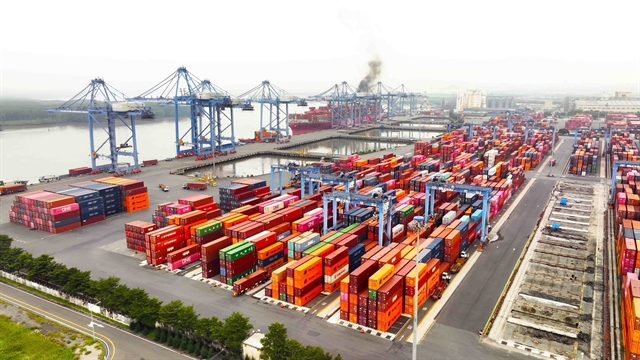 Economy
Economy


|
| Containers at Cái Mép - Thị Vải Terminal. Experts said Việt Nam should consider founding an insurance fund to support small and medium - sized enterprises (SMEs) in international trade amid increasing uncertainties in global markets. — VNA/VNS Photo Vũ Sinh |
HÀ NỘI — Amid mounting global trade uncertainty, experts are urging the establishment of an international trade insurance fund to protect Việt Nam’s small and medium-sized exporters.
With global markets becoming increasingly unpredictable, such a fund is being positioned as a vital tool to help ensure the country’s ambitious export and growth targets remain within reach.
The recommendation comes as Việt Nam aims for a 12 per cent increase in exports this year to support its GDP growth target of 8.3 to 8.5 per cent. However, the export landscape is dominated by small and medium-sized enterprises (SMEs) that often lack the resources and risk mitigation tools to weather serious trade disruptions.
Without adequate safeguards, these businesses remain vulnerable to a wide range of risks, including payment disputes, buyer insolvency, political instability and currency fluctuations. The impact of even a single failed transaction in an overseas market can be severe, with some businesses forced to halt operations or file for bankruptcy as a result.
Hoàng Ngọc Thuận from the Foreign Trade University noted that any disruption in international trade could lead to serious consequences, including financial collapse for vulnerable SMEs.
Chairwoman of Hanel FT NextTech Trần Thị Thu Trang said an international trade risk insurance fund should be developed under a public–private partnership model. Under the proposal, companies would pay a premium of approximately 0.5 to 1 per cent of a contract’s value.
In the event of loss or disruption, the fund would compensate a significant portion of the damage. For SMEs entering new or high-risk markets, part of the premium would be subsidised by the State, giving businesses greater confidence to explore new opportunities.
General Secretary of the Việt Nam Fruit and Vegetable Association Đặng Phúc Nguyên said the proposed fund would offer substantial benefits, particularly for SMEs looking to access international markets.
Trang pointed to similar insurance models already in place in developed economies. Japan’s Nippon Export and Investment Insurance (NEXI) provides cover against partner insolvency and political risk in more than 100 markets. In the European Union, Allianz Trade operates in over 50 countries with compensation levels of up to 90 per cent. The Export–Import Bank of the United States offers credit insurance to reduce the risks associated with international trade.
These organisations are financially autonomous, using revenue from insurance premiums and investments to maintain operations, while still receiving State funding when needed, according to Nguyên.
In Việt Nam, the fund could be created as an independent body, either as a State-owned insurer or a joint-stock company with government participation. Premiums would be calculated based on factors such as contract value, partner credibility and market risk profile.
Thuận stated that any such mechanism must align with World Trade Organisation (WTO) rules to avoid being considered a prohibited subsidy. He also emphasised the need to assess international models carefully to ensure the chosen structure fits Việt Nam’s economic and legal conditions.
With global trade facing increasing levels of disruption, the push for such a fund is gathering momentum. Advocates say it will help build resilience across Việt Nam’s export sector, ensuring SMEs can continue expanding into new markets without bearing unsustainable levels of risk.
As Việt Nam accelerates its international economic integration, the need for an effective, rules-compliant insurance mechanism is becoming more urgent. A well-designed fund could provide critical support to the very businesses that drive the country’s export engine, ensuring long-term competitiveness and sustainable growth. — VNS




